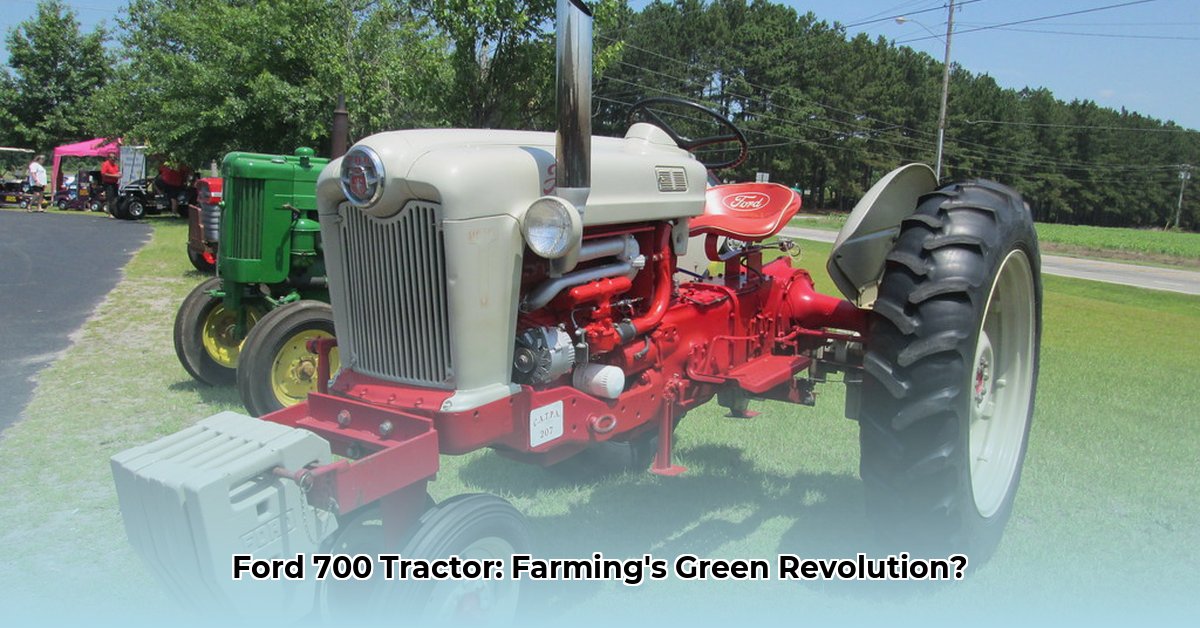
A Piece of History, A Lesson for Today
The distinctive chug of a Ford 700 tractor isn't just the sound of an engine; it's the echo of a bygone era in farming. This isn't merely a story about a machine; it's a narrative woven into the fabric of agricultural progress and its evolving relationship with environmental sustainability. This exploration delves into the Ford 700's impact, examining its strengths and weaknesses concerning sustainable practices, offering practical advice for maintenance and operation, and ultimately, highlighting its enduring relevance in today's agricultural landscape. For more on Ford tractors, see this helpful resource: Ford Tractor Info.
From Horsepower to Tractor Power: A Technological Leap
The Ford 700 emerged during a pivotal period—the mid-20th century's agricultural revolution. Tractors were transitioning from luxury items to indispensable tools; Ford, a giant in the automotive industry, made a significant foray into agriculture, and the 700 became a flagship model. This powerful machine represented a monumental technological advance, shifting farming from back-breaking manual labor and animal dependence to a new era of efficiency. But this efficiency came at a cost. The increased mechanization led to larger farms, impacting land use and potentially increasing the environmental footprint. The narrative of progress isn't always straightforward; it's often a complex interplay of benefits and drawbacks.
Environmental Impact: A Balanced View
Precisely quantifying the Ford 700's environmental impact is challenging. Comprehensive data on fuel consumption and emissions from that era are scarce. However, we can offer a comparative perspective. While significantly more efficient than horse-drawn plows, the 700's fuel efficiency and emissions levels would likely be deemed high by modern standards. This illustrates the inherently fluid nature of "sustainability"—a concept that evolves with technological advancements. A complete evaluation must also consider the entire lifecycle: manufacturing materials, operational lifespan, maintenance requirements, and eventual disposal. The longevity and repairability of the machine are crucial aspects of this assessment.
Ford's Enduring Influence: Lessons Learned
Ford's contribution to agriculture extends far beyond a single tractor model. Its commitment to innovation established a new industry benchmark, influencing the design and manufacturing of subsequent farm machinery. This relentless pursuit of technological progress, however, introduced its own challenges. Older machines, including the Ford 700, eventually became obsolete, resulting in substantial waste and environmental concerns. The sheer volume of discarded equipment is a poignant reminder of the need for responsible innovation and sustainable practices throughout a product's lifecycle.
Charting a Course Towards a Greener Future
Learning from the past is crucial for building a sustainable agricultural future. This necessitates a multi-faceted approach involving farmers, manufacturers, and policymakers.
Key Takeaways:
- Durability Matters: The Ford 700's robust design leads to longer lifespan and reduced replacement waste – a key element of sustainability.
- Beyond Fuel Efficiency: The analysis of its environmental footprint needs to span its entire life cycle, from manufacturing to disposal.
- Community and Knowledge: The use of older equipment often fosters a community-based approach to repair and maintenance, reducing waste and promoting knowledge sharing.
Actionable Insights: A Path Toward Sustainability
- Farmer Focus: Prioritize repair over replacement whenever feasible. Explore alternative fuels (biodiesel) to reduce emissions.
- Manufacturer Responsibility: Design tractors for longer lifespans and easier repair. Invest in responsible end-of-life recycling programs.
- Policymaker Engagement: Fund research into the environmental impact of agricultural machinery. Promote policies incentivizing sustainable practices.
Conclusion: A Legacy of Innovation and Sustainability
The Ford 700 serves as a powerful symbol of agricultural evolution. Its legacy is a blend of progress and environmental challenges, offering valuable lessons for the future. By understanding both sides of this legacy, we can pave the way for more responsible and sustainable farming practices. The past provides not just history, but a roadmap to a greener tomorrow.